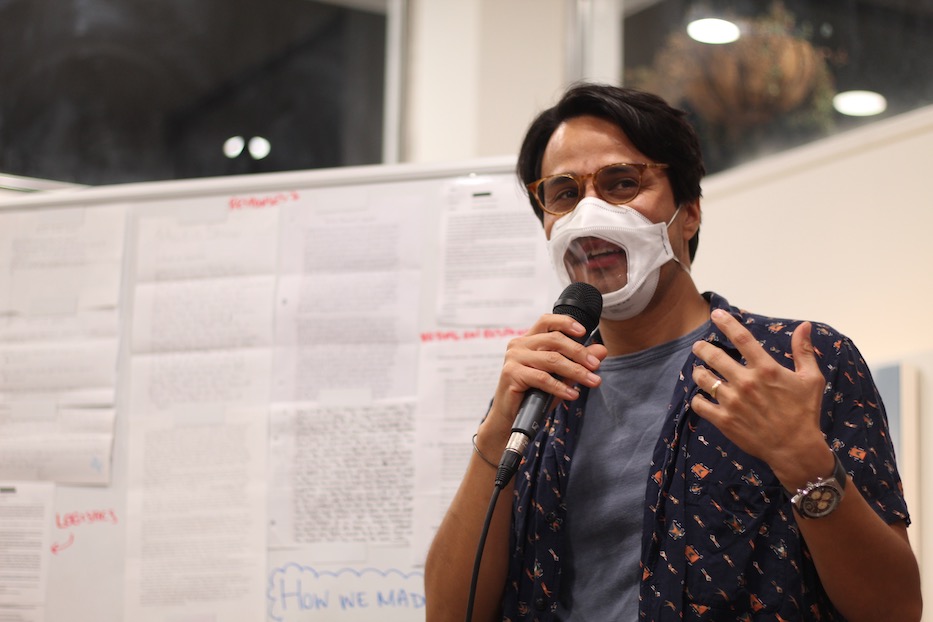
Culture & Community | Incarceration | Radio & Audio | Arts & Culture | Arts & Anti-racism
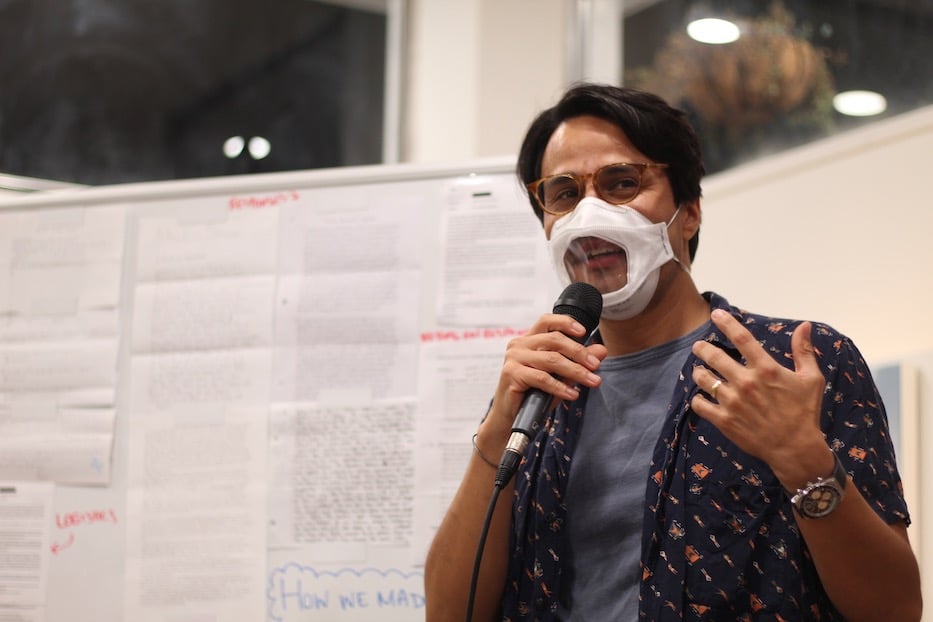
Luis Luna, one of the co-producers on "Abolition Transmission," speaking at a recent launch event for the show at Possible Futures bookspace. A, who also works on the show, asked not to be photographed. Lucy Gellman Photos.
The voices filled Possible Futures one by one, at once intimately close and very far away. “What’s next?” one asked. “Sooner or later, we’re all gonna have to come together and put a stop to this. If we don’t, how far will they go?” A beat, and another voice came in. “I guess when you live in despair, it’s just hard and lonely work.” A third voice: “We have the most intimate experience with state violence.”
An automated message cut in: “You have one minute left.” Back in the bookstore, a listener could have heard a pin drop.
It’s a familiar sound for “Abolition Transmission,” a new radio program and podcast from New Haveners Luis Luna and A, with 13 collaborators who are currently incarcerated across the country and remain largely anonymous throughout the show. Episodes are broadcast out of WPKN 89.5 FM in Bridgeport and are accessible online through the program's website. WPKN reaches correctional institutions in Danbury, Newtown, New Haven, Cheshire, and Bridgeport.
It is funded by individual donations and a REACH (Racial Equity and Creative Healing) grant for $22,500 from the Community Foundation for Greater New Haven and the Arts Council of Greater New Haven. In the interest of full transparency the Arts Paper is funded by the Arts Council but editorially independent from it.
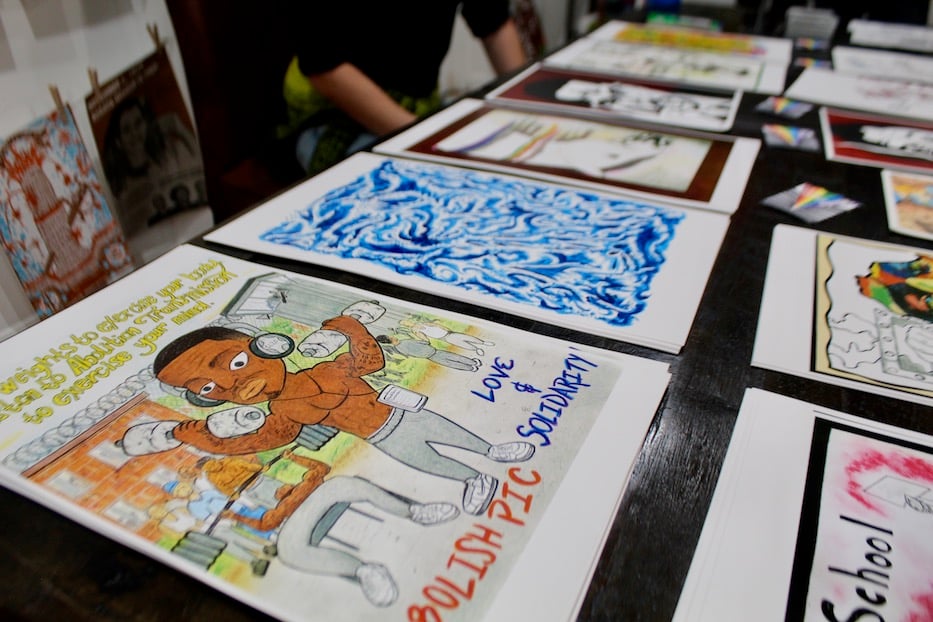
Artwork from individuals who are currently incarcerated was on sale to benefit the show during a recent launch event.
Abolition, in this context, is a belief in the end of the prison industrial complex, policing, and the carceral state. After releasing the first full episode last month, team members are working on a second program of messages from family members of individuals who are incarcerated for February 2023. Collaborators include In The Belly, a zine dedicated to the artwork and words of people who are incarcerated, as well as A.B.O. Comix and #PrisonsKill among several others.
“Abolition Transmission’s goal is to give a clear understanding of what abolition means and why it is so desperately needed,” says one of the collaborators in the first episode, which producers replayed at Possible Futures on a recent Saturday night. “A lot of incarcerated men and women, as well as their loved ones, have never heard the system referred to as the prison industrial complex, and thus have no idea what abolition is.”
The show was born earlier this year, largely as an outgrowth of the organizing work that both A and Luna have tapped into in New Haven, and across the country with collaborators who are organizing and educating behind bars. For years, Luna has worked in both immigrant rights advocacy and community radio, bringing those loves together with programming on WPKN and work with the Semilla Collective, Working Families Party, Make The Road CT and Husky 4 Immigrants.
In addition to his monthly program “Módulo Lunar” on WPKN, he has worked as a co-producer on “Melting The ICE,” a podcast that pushes back on Immigrations and Customs Enforcement policies that detain and deport immigrants and separate families.
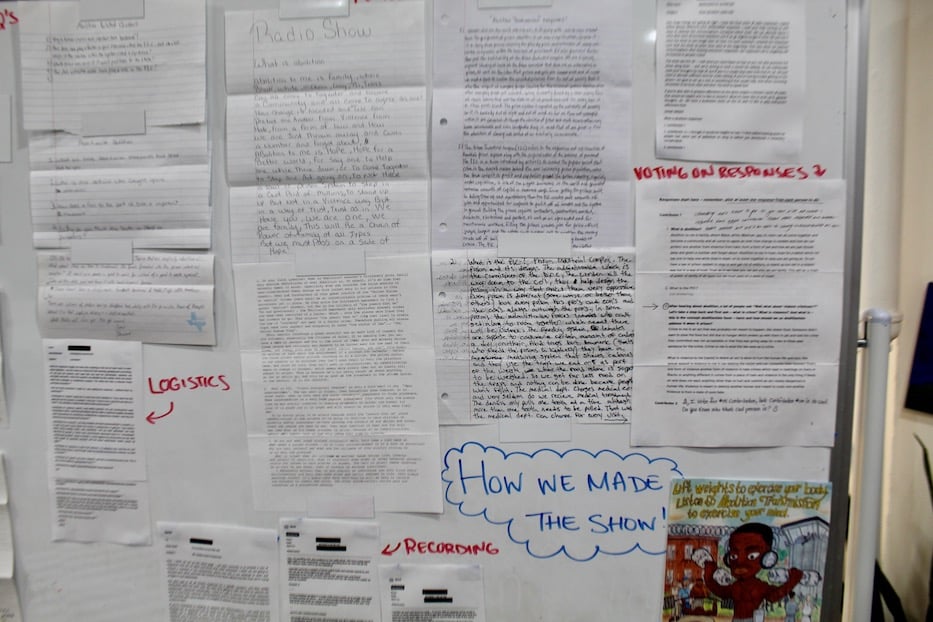
A, who is a computational biologist by day, became interested in abolition work roughly three years ago, after discovering A.B.O. Comix and the website Dreaming Freedom Practicing Abolition. From there, they connected with the abolitionist writer Stevie Wilson, who is currently in the Pennsylvania Department of Corrections. That led to connecting with more individuals what were incarcerated. They described 10 of the show’s collaborators as “good friends of mine;” another three are close with a fellow abolitionist friend who brought them on.
That organizing became the root of the show. When Luna and A met at the Semilla Collective’s inaugural “Festival of Resistance” last year, “our values were aligned,” Luna said. In particular, he was fascinated by the work that A was doing to amplify the voices of those behind bars. As someone who has long thought of radio as a medium that can reach people, his mind went immediately to WPKN’s studio.
“I said, we have this space, how can we work together?”
Episodes—from research, recording, and editing to intro music and cover art—are deeply participatory and happen by a process of majority vote and consensus. While A and Luna do much of the logistical and production work, both stressed that the focus of the show is on the individuals who are incarcerated, and use their lived experience inform their work around abolition . During a recent launch of the show at Possible Futures, the two assembled a board showing how the first episode was made, with dozens of written responses that ultimately became a 49-minute collage of voices from the inside. 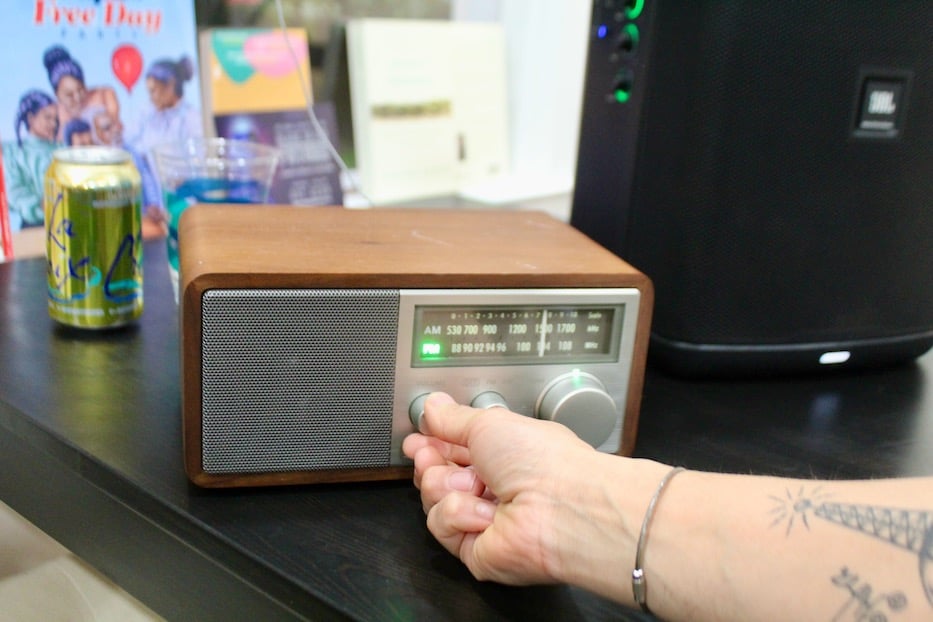
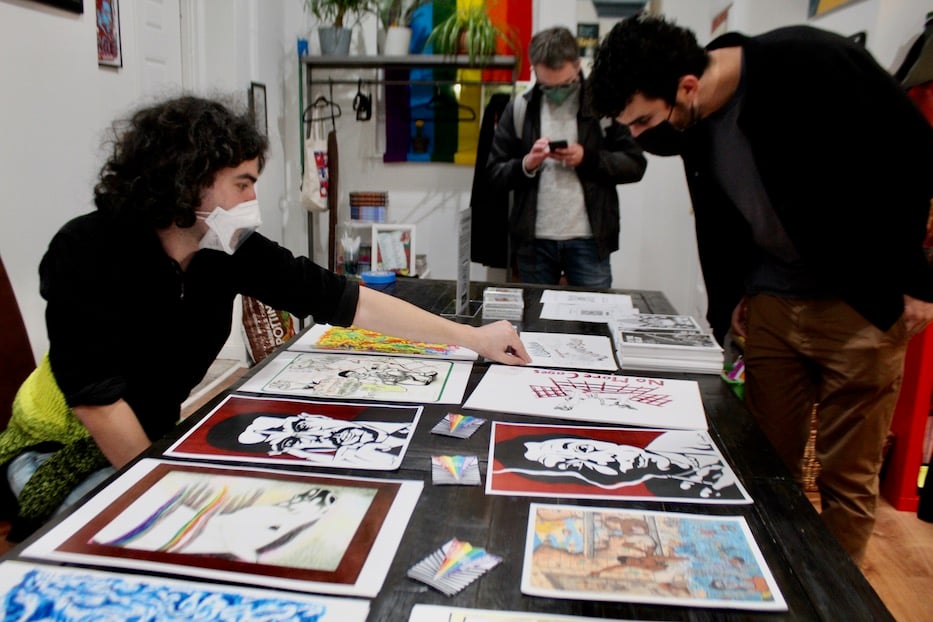
Sound artist Jake Gagne, pictured at left, worked closely with Lee Teka on musical collaborations that are part of the show's sonic fabric. At a recent launch event, they said that more music is on its way.
That collaborative spirit extends to every aspect of the show, they added. A collaborator that A referred to only as James designed what became the promotional flier, and the image most closely associated with the show. In it, a man lifts weights in a prison’s recreation yard, headphones over his ears as he works out. Behind him, a coil of barbed wire rises from a high fence meant to keep people in. From a nearby watchtower, a guard leans down with a weapon in his hands.
It’s a reminder that everybody—and every body—is being surveilled in multiple ways, in real time. The words Lift weights to exercise your body/Listen to Abolition Transmission to exercise your mind float above in yellow letters. It echoes a snippet from the first episode, in which a collaborator asks: “We must question, what type of society does the state really want?”
So too does the show’s theme song, from collaborator Lee Teka and sound artist Jake Gagne. Teka, a genderfluid, multimedia artist who has maintained their innocence for just over two decades, is currently incarcerated in Texas. Gagne, a program administrator in public humanities at Yale, is a multimedia artist based in New Haven. In the lead up to an October launch of the first episode, the two put out a layered version of Teka’s song “When The Game Is Not A Game.”
In the piece, Teka’s vocals are recorded from a prepaid call; Gagne has added in bells, percussion, horn and whistle sounds. As the song begins, horns rise into Teka’s voice, percussion hammering beneath them. They say that they want justice, but ‘just us’ by ‘just them’ is really just a hustle, extortion, corruption. the song begins. It’s nothing but a scheme! The rich they let go free/While the poor in jail they keep! Come and ransom me.
“I envisioned a football game and a marching band and the whistle sound effect,” Teka wrote in a statement that Gagne read at the recent launch at Possible Futures.
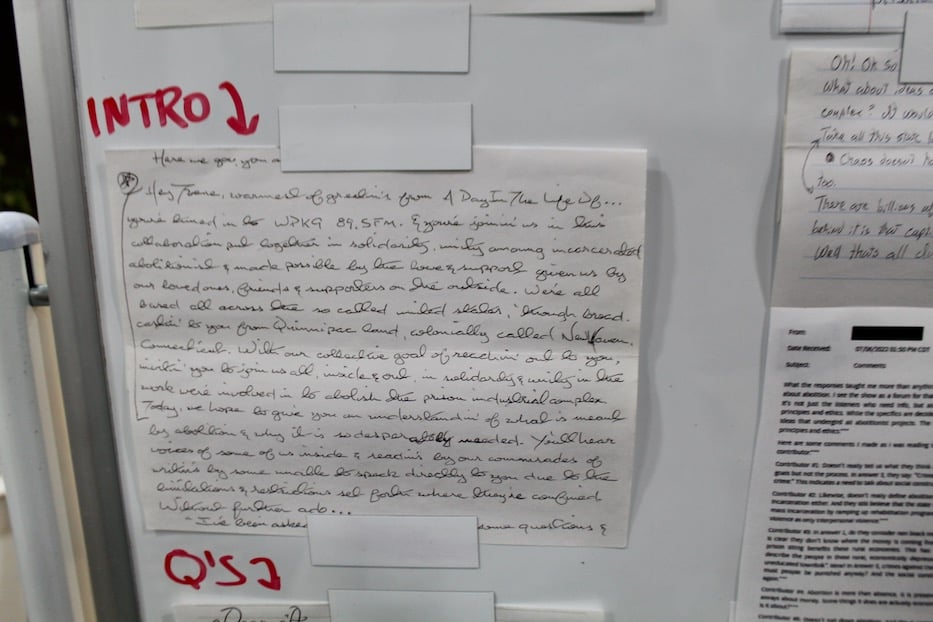
Questions for the first episode include "What is abolition?" and "What is the prison industrial complex?"
That collaborative approach is clear from the first minutes of the show too. In the first episode, collaborators discuss what abolition is, where the idea comes from, and how to be an ally for listeners—particularly white, cisgender, able-bodied listeners—on the outside. One, who is currently at Trenton State Prison, notes how many fellow prisoners do not believe in abolition, in part because they’ve never heard of it.
They press on the idea of the prison industrial complex, envisioning a world where more restorative, rehabilitative systems have replaced prisons, police, and what Michelle Alexander effectively dubbed years ago “The New Jim Crow.” Looking to history, they tie a thread from the enslavement, de facto segregation, and economic disenfranchisement of Black people to the prison system that exists today.
“Abolition isn’t just about getting rid of buildings full of cages, it’s also about undoing the society we live in, because the PIC both feeds on and maintains oppression and inequalities through punishment [and] violence while controlling millions of people,” they say. The words hang in the air after the track has moved on to the next speaker.
The trust that producers put in voices from the inside—voices with intimate lived experience, that wouldn’t otherwise be heard—extends beyond the making of the show, Luna and A said. While part of the REACH grant funding goes toward production of the show, hundreds of dollars are reserved for collaborators’ commissary accounts. That money will allow them to buy basic necessities, from hygiene items to phone calls.
At a recent launch of the podcast, Luna pointed to the transformative power of radio, an old-school medium that has withstood the test of time. After coming to Connecticut from Ecuador with his mother, “I had to find my communication,” Luna said. It was on the radio that he heard Mexican rock on WPKN over a decade ago, and realized he wanted to be a part of something. It was also through radio that he learned about his first New Haven rally, held on International Workers’ Day on May 1 over 15 years ago.
“I realized that it’s a space where producers can really have their voices, their stories heard,” he said. “How do we create a new cultural economy?”
He later added that the team is also working to get the show on fellow radio stations across the country, where their frequencies could reach more individuals who are in prison. On Columbia’s student radio station 89.9 FM in New York, for instance, the frequency reaches Hudson County Correctional Facility, Essex County Correctional Facility, Bergen County Jail and Elizabeth Contract Detention Facility.
Listen to the first episode of Abolition Transmission here. To learn more about the show, or to share a message that you or someone you know has for an incarcerated loved one, contact abolitiontransmission@protonmail.com or write to Abolition Transmission, PO Box 8531, New Haven, CT 06511.

